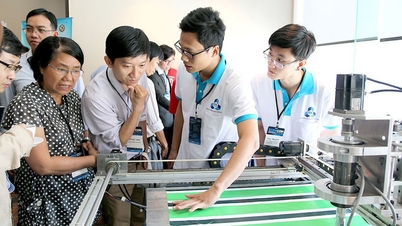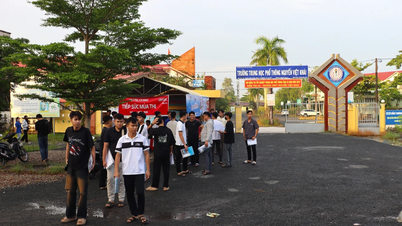The main changes are related to the subjects and forms of the exam. In each stage, the national exam for 12th graders also marks a step forward in applying scientific achievements in measurement and evaluation; applying modern testing theory and applying information technology in organizing the exam, gradually approaching the exam/admission trends of advanced countries. However, the unchanged point is that in each stage, this exam is directed by the Ministry of Education and Training , organized at the same time nationwide and organized on paper.
The 4.0 industrial revolution requires all industries and systems to fundamentally change their thinking and work organization methods. Currently, technology has changed the methods of assessing learners' results: from paper-based assessment to online assessment; from classroom assessment to large-scale assessment... Prestigious independent testing organizations in the world have converted many exams from paper-based to computer-based, online...
The policy of organizing the High School Graduation Exam on computers has been proposed by the Ministry of Education and Training for several years now. The plan to organize the exam and consider recognizing High School Graduation from 2025, issued by the Ministry of Education and Training in 2023, clearly states: After 2030, gradually pilot computer-based exams for multiple-choice subjects in qualified localities (can combine paper-based exams and computer-based exams).
When all localities nationwide have sufficient conditions, they will switch to organizing the High School Graduation Exam on computers for multiple-choice subjects. Recently, concluding the national online conference on preparations for the 2025 High School Graduation Exam, Prime Minister Pham Minh Chinh requested the development of a project to prepare the necessary conditions for a pilot organization of exams on computers in a number of localities from 2027, moving towards organizing exams on computers as soon as possible.
Organizing exams on computers is a trend with confirmed benefits, such as: Improving objectivity, transparency, fairness; increasing efficiency and cost savings; in line with the digital transformation trend. In fact, in recent years, implementing competency assessment exams at prestigious and large-scale universities, as well as some online exams, has given us some valuable experiences, gradually removing basic obstacles.
However, with a large-scale national exam, it is necessary to anticipate some difficulties and challenges. The first difficulty is the information technology infrastructure with the current lack of equipment; the risk of power outages and Internet connection problems. Developing an online exam software system that is strong, secure, stable, and capable of handling millions of simultaneous visits is a complex task, requiring a team of high-quality information technology experts.
In addition, there are difficulties related to the ability to use information technology of candidates and exam supervisors; the concerns of parents and students because they are used to the traditional exam format; the issue of information security and safety on the system; initial investment costs... In particular, switching to computer-based exams requires changes in the way questions are set, building a large enough question bank that is suitable for the new exam format.
Therefore, to effectively implement the Prime Minister's directive, it is necessary to take immediate steps to prepare for technological infrastructure, human resources, test banks, test content, mechanisms, policies and laws. Strengthening communication to create consensus in society, reduce anxiety for parents and students and mobilize social resources are also important solutions that need to be implemented.
Source: https://giaoducthoidai.vn/chuyen-doi-tat-yeu-ky-thi-danh-cho-hoc-sinh-lop-12-post737919.html


![[Photo] General Secretary To Lam attends the ceremony to celebrate the 80th anniversary of the post and telecommunications sector and the 66th anniversary of the science and technology sector.](https://vphoto.vietnam.vn/thumb/1200x675/vietnam/resource/IMAGE/2025/9/29/8e86b39b8fe44121a2b14a031f4cef46)


![[Photo] General Secretary To Lam receives US Ambassador to Vietnam Marc Knapper](https://vphoto.vietnam.vn/thumb/1200x675/vietnam/resource/IMAGE/2025/9/29/c8fd0761aa184da7814aee57d87c49b3)
![[Photo] Many streets in Hanoi were flooded due to the effects of storm Bualoi](https://vphoto.vietnam.vn/thumb/1200x675/vietnam/resource/IMAGE/2025/9/29/18b658aa0fa2495c927ade4bbe0096df)
![[Photo] National Assembly Chairman Tran Thanh Man chairs the 8th Conference of full-time National Assembly deputies](https://vphoto.vietnam.vn/thumb/1200x675/vietnam/resource/IMAGE/2025/9/29/2c21459bc38d44ffaacd679ab9a0477c)

































































































Comment (0)